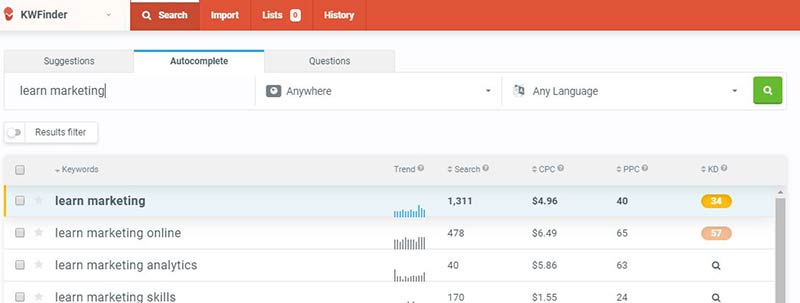We have a love/hate relationship with autocomplete. It’s gotten pretty good over time.
Why love? It’s a great experience when we’re searching for things on Google.
Why hate? Because as SEOs, it funnels search traffic into specific phrases and lessens the number of longer tail queries which might otherwise have been.
In this short post, we going to show you how to research autocomplete keyword volume using our new favorite keyword research tool.
How To Research Autocomplete Keyword Search Volume
Step 1: Enter a short tail keyword phrase into Mangools
We recommend going short tail here so you can get some of the most common medium-tail terms. If you really want to get granular, search something more on the medium tail side.
Step 2: Toggle the search tool to Autocomplete

Step 3: Read the results, sort as needed
Mangools provides a great filter for limiting the results-set to focus on common autocomplete terms. You’ll get access to Google’s autocomplete data plus estimates on search volume, competition, whose ranking for what, etc. just link most other link research tools. Feel free to sort by competition, search volume, trend, etc. The key is to explore the topics which are commonly autocompleted for users to provide ideas for content and existing content optimization.
Step 4: Create content
Now that you have data on autocomplete, you can create long-tail content behind it. If you believe in the silo approach to SEO, this is the ammo to create content behind a lot of the topics related to your initial search query. This not only gives you the opportunity to rank for common medium/long tail terms, but also to further support your short tail content.
Benefits of Optimizing for Autocomplete for SEO
The autocomplete optimization strategy has a few major uses and benefits.
- Create content for short-tail keywords which naturally have high search volume because they are recommended via autocomplete
- Find long tail keywords which have added search volume becuase of autocomplete
- Gain a firm understanding of topics related to your initial queries in the eyes of Google
Related Resources


Leave A Comment